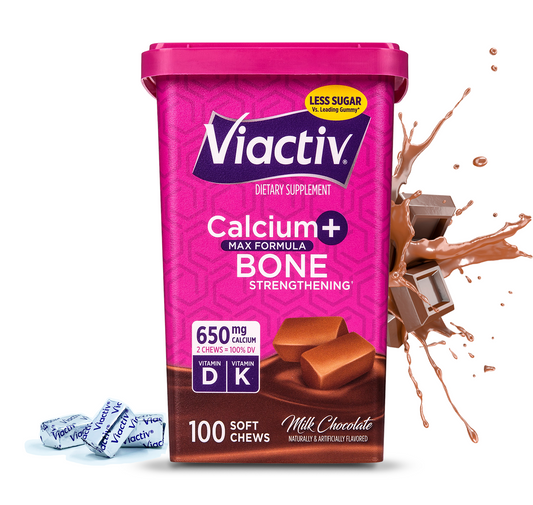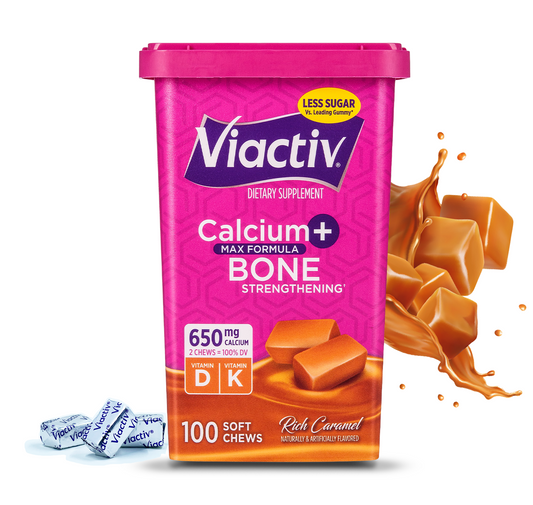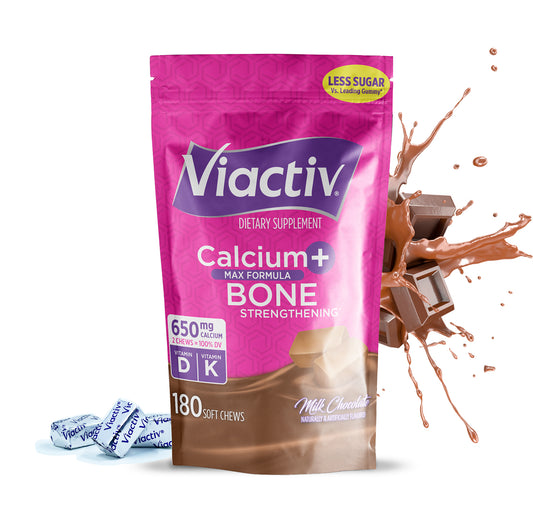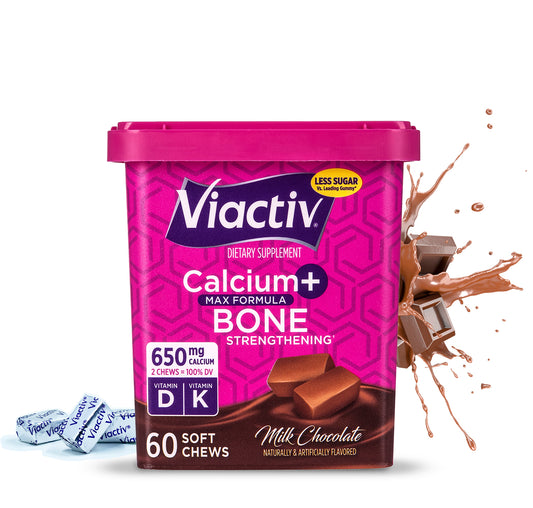

Calcium: Why it Matters, Key Benefits, & Deficiency Symptoms
Discover all the ways calcium benefits your entire immune system and bone health, plus how taking a daily vitamin can help prevent a calcium deficiency.

Keep Strong at Every Stage
Your bones undergo lifelong changes – and getting the right amount of calcium is key to keeping you going strong. Your body can’t make calcium, so it absorbs it from your diet and supplements. That’s why getting calcium benefits early on and throughout life is so important.
Storing Calcium for the Future
The Food & Drug Administration (FDA) recommends 1300mg of calcium per day for anyone over 4 years-old to help increase bone mass and strengthen bones.
-

Building Bone Mass in Your Teens
Your bones absorb more calcium between the ages of 9 and 18 than during any other period in your life reaching peak bone mass in your 20s. Up to 90% of a teen girl’s bone mass is achieved by the age of 18. The more calcium you store during your teens, the greater your peak bone mass as an adult.†
-

Support for You & Your Baby During Pregnancy
When you’re eating for two, you’re eating to support your health and your baby’s development. To do both, you need to make sure you’re getting enough nutrients, vitamins, and minerals from your diet – including calcium to build their teeth and bones, as well as develop their circulatory, muscular, and nervous system† - the same systems you need calcium to support.
-

Maintain Strong Bones After Menopause
Adequate amounts of calcium and vitamin D as part of a healthy diet – along with physical activity – may reduce the risk of osteoporosis in later life.† After your 30s, your body produces less new bone, and you experience more bone loss. But, you can slow down bone loss and help reduce your risk of osteoporosis with proper nutrition and exercise.

What are Examples of Calcium-Rich Foods?
Getting nutrients from your daily food choices is always a best first choice. Some calcium-rich foods include almonds, oranges, soybeans, garbanzo, white and pinto beans, low-fat dairy such as milk and yogurt, and leafy green vegetables such as kale, spinach, and broccoli, in addition to high-quality supplementation.

What is Calcium Deficiency?
Calcium deficiency means you’re not getting enough calcium to support your bodily needs. Calcium deficiency symptoms may include muscle aches, cramps, or spasms, in addition to numbness or tingling in the hands, arms, feet, and legs. There are also some groups that may be at a higher risk including postmenopausal women, people who follow a strict vegetarian or vegan diet, and people who are lactose intolerant.
Calcium Benefits
Bone Strengthening
Optimizing peak bone mass during adolescence and early adulthood contributes to bone strengthening and has been shown to build and maintain good bone health. For women and men, developing and maintaining peak bone mass is a key for healthy aging.
Pregnancy Health
The daily recommended serving of calcium for pregnant women is 1,000mg per day. A baby’s bone health peaks during the third trimester and 250mg - 350mg of calcium is transferred from mother to baby daily. Calcium supplementation has been shown to reduce the risk of preterm delivery in women with low calcium intakes, supporting full-term labor and delivery. If you do not consume enough calcium in your diet during pregnancy, your body will take what your baby requires from your own calcium needs.
Children's Health
Your bones absorb more calcium between the ages of 9 and 18 than during any other period in your life reaching peak bone mass in your 20s. The CDC recommends 1300mg of calcium daily during this period to support strong bone mass throughout your life.
Muscular System
Muscle contraction is known to be regulated by calcium. When your muscle moves, a motor neuron is queued on the muscle cell surface, activating calcium channels in the muscular system, and allowing calcium to flow into the muscle cell. Another role of muscle contraction is to support the heart muscle. Without calcium, our hearts wouldn’t be able to maintain a healthy heartbeat.
Circulatory System
Calcium supports our circulatory system as it helps blood vessels tighten and relax when they need to. This allows blood to travel easily through veins allowing your body to keep your blood warm and deliver oxygen to your muscles and organs. Your body needs calcium for proper elasticity in circulation. Proper elasticity of blood vessels = healthy circulatory system.
Nervous System
Calcium is a crucial element to how the nerve cells in your brain, and other parts of your nervous system, communicate. Calcium concentrations let neurons know that it’s time to release the chemical message neurons used to communicate with each other. The chemical messages it receives are transformed back to an electrical signal in the next nerve cell, and the process repeats. Calcium also has
a role in cell repair should a nerve cell become damaged.
PMS Symptoms
70-90% of reproductive age women have reported some type of PMS symptom. Research has supported that women who have diets rich in vitamin D and calcium can reduce or even eliminate PMS symptoms.
Gastric Bypass
Research shows that calcium deficiency develops in approximately half of patients that have undergone gastric bypass surgery. Lifelong adherence to dietary calcium and vitamin D is very important to maintain calcium levels post gastric bypass surgery. The Mayo Clinic recommends 1,200mg –1,500mg of calcium per day after gastric bypass surgery.
Calcium Blog Posts
FAQS
What is calcium carbonate?
Supplemental calcium usually comes in two forms: Calcium Citrate and Calcium Carbonate. These forms contain varying amounts of elemental calcium. Elemental calcium is the amount of calcium that is actually used by the body. Calcium carbonate is 40% elemental calcium by weight, whereas calcium citrate is 21% elemental calcium. This information can be found on the supplement facts panel, typically on the back or side packaging of a calcium supplement.
What does calcium do for the body?
Calcium is the most abundant mineral in the body. Your body needs calcium to build and maintain strong bones. In fact, almost all calcium is stored in bones and teeth; however, your heart, muscles and nerves also need calcium to function properly.
What is the best form of calcium to take as a supplement?
Supplemental calcium usually comes in two forms: Calcium Citrate and Calcium Carbonate. These forms contain varying amounts of elemental calcium. Elemental calcium is the amount of calcium that is actually used by the body. Calcium carbonate is 40% elemental calcium by weight, whereas calcium citrate is 21% elemental calcium. This information can be found on the supplement facts panel, typically on the back or side packaging of a calcium supplement.
Why is calcium important for bone health?
Calcium is essential for building and maintaining healthy bones throughout life. 99% of calcium in the body can be found in bones and combines with other minerals to form hard crystals, giving bones strength and structure. In addition, calcium supports bones by helping muscles function optimally which, in turn, support bone strength and mobility.
What are the side effects of calcium supplements?
Calcium supplements cause few, if any, side effects; however, sometimes constipation may occur. It is important to stay hydrated while taking calcium and if you experience constipation, please contact a healthcare provider.
What causes calcium deficiencies?
Simply put, a calcium deficiency is when the body does not have enough calcium to maintain healthy calcium levels in bones, teeth, heart, muscles, nerves, etc. There are many factors that would potentially cause a calcium deficiency including diet, some medications, or a pre-existing medical condition. You can be tested by your healthcare provider to determine if you have healthy calcium levels. There are groups that may be at a higher risk. According to
data published in March 2022 in the Annals of the New York Academy of Sciences, approximately half of the world’s population has inadequate access to dietary calcium which puts them at risk for calcium deficiency.
How do I know if I am at risk for calcium deficiency?
Some signs of calcium deficiency include muscle aches, cramps, or spasms. Numbness or tingling in the hands, arms, feet, and legs have also been documented as signs that you might not be getting enough calcium to support your bodily needs. You can be tested by your healthcare provider to determine if you have healthy calcium levels.
When should a pregnant woman start taking calcium?
The World Health Organization (WHO) recommends an intake of 1.5 - 2.0g of elemental calcium per day from 20 weeks’ gestation until the end of pregnancy. Calcium supplementation during pregnancy supports healthy gestational changes including maintaining healthy blood pressure and supporting healthy, smooth muscle contractions.
What happens if you don’t take calcium during pregnancy?
During pregnancy, it’s crucial that you maintain adequate levels of calcium to support a remarkable series of physiologic changes for both mom and baby. To do so, you need to make sure you’re getting enough nutrients, vitamins, and minerals from your diet – including calcium to build your baby’s teeth and bones, as well as develop their circulatory, muscular, and nervous system - the same systems you need calcium to support.











